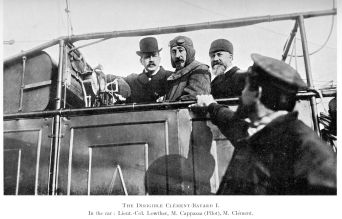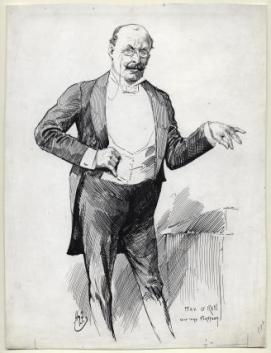
Cecil Lowther
Guest Post 17. In the last half of the 19th century, if your surname was Lowther and you were male, you were most likely to be well-off, or even rich. The most famous Lowther, Hugh Cecil Lowther, the 5th Earl of Lonsdale, was rich beyond most people’s wildest dreams. His wealth was based on coal. The Lowthers, as well as being “hunting shooting and fishing” men were keen sportsmen. Lord Lonsdale was famous for his support for many sports.
Henry Cecil Lowther, known always as Cecil, was a cousin of Lord Lonsdale and the fourth son of William Lowther. He was to have a successful army career as an officer in the Scots Guards, finishing as a Major-General. Born in 1869, he was commissioned in 1888. To be an officer in the Scots Guards you had to be tall and well-built and have a decent private income. He was also a keen sportsman and a very good footballer. He was so good a player that, had he been born a hundred years later he might have become a professional soccer player. Before he joined the army, he was sent out to a brother’s ranch in Montana to help with the cattle round-up and incidentally expand his education in the tougher ways of the world – which it certainly did.
…for younger sons of noble families who possessed few skills other than riding and shooting, and titled first sons who sensed their British fortunes slipping away, raising cattle along the Rocky Mountain front seemed to offer an irresistible mix of pleasure and profit.¹

Cecil as a teenage cowboy
In Montana you could buy 160 acres and secure a house, corrals and water. Cattle could be driven up from Texas and then allowed to range free on the newly opened land on what was known as free-range. The fattened cattle would then be sold at substantial profit in the East. Cecil Lowther found himself working hard in a different world to that which he had been accustomed. It served him well and he began to write down his experiences.
Young Cecil soon had an introduction to raw life in the West. A few days before he arrived at his destination, Billings, Montana, a tramp had killed a bar-keeper. Not trusting local law some residents set up a lynch party and broke the killer out of gaol and hanged him from a telegraph post. The local photographer duly took a photo of the hanged man, but some days later a number of the lynch party visited the photographer and made him destroy the negative,
…for, said they, it was a disgrace to a rising town such as theirs that a man should be hanged with the knot under the wrong ear…²
For some reason Cecil Lowther retained a copy of the gruesome photograph among his souvenirs and he confirmed that, sure enough, the knot of the rope was beneath the right ear and not the left one. In a few weeks as a junior hand on the wide spaces of Montana he learned much about horsemanship and surviving in rough conditions which was to be useful as a soldier on the African veldt in the South African War. After the round-up he had a few dollars in his pocket and decided to take the train to San Francisco and pay a brief horseback visit to Yosemite Valley and then pick up a stagecoach. It was late in the season and no regular guides were available except for one rough looking character. Waiting for the stage they rested in a log shack. Cecil had already started smoking a pipe, which he lit. He was going to throw the still smouldering match into a corner, but fortunately decided against it and he carefully blew it out.
A few minutes later, I walked over into the corner to see what some tins were along the wall. They contained ‘giant’ blasting-powder, and two of them were open and partly full. So I went out and waited for the stage-coach by the roadside with an uncomfortable feeling about the pit of the stomach.³
The next night, waiting for the next stage to San Francisco and having spent his spare money, he was forced to spend the night sleeping:
…with the rats on the floor of Berenda waiting-room, between a tramp and a Chinaman, and was back in San Francisco a few hours later.
Returning to England, he joined the Scots Guards with an experience of life far greater than his contemporary young upper-class Guards officers.
By the time the Second Boer War had started in 1899, Cecil Lowther had risen to the rank of captain and was appointed adjutant to his battalion. For his exemplary service in the war he was awarded the D.S.O. and his name was noted as a probable future staff officer.

Lowther in the airship
In 1905 he was appointed as the Military Attaché at Paris, Madrid and Lisbon, based mainly in Paris. This was an important position, but as it was city-based it gave no real scope for adventure. At the annual reviews he was required to attend there was an increasing interest in aviation. In 1908 there appeared an extraordinary “dirigible”, the Clement-Bayard 1. These inventions eventually became to be called airships. The appearance of this airship gave Cecil Lowther an opportunity for what was then an adventurous flight.
I was fortunate enough to make an ascent in the Clement-Bayard, and was the only Military Attache who was thus favoured. An official request to ascend would probably not have been granted, but, seeing the dirigible sailing over Paris on her first ascent, I dashed off to the telegraph office and wired to Mr. Oddenino, of the Imperial Restaurant, to see if he could get leave for me to go up. To telegraph to a Regent Street restaurant for authorization to go up in a French dirigible at Sartouville seems rather circuitous, but I knew that my friend Oddenino was one of M Clement’s best friends, and within forty-eight hours one of the latter’s cars was scouring Paris to find me and run me out to the place of departure. The car was just ballasted up, and they were leaving, but one of the workmen jumped out, I jumped in, and away we went to sail over Paris.
I had often been up in spherical balloons before,* but this was quite a new experience. We were three passengers in a fine big car, where one could walk about freely, and, besides ourselves, there were two pilots and two mechanicians. The solidity and power of the great machine gave a wonderful sense of security – at least, it did to M. Clement and to myself. Not so to the third passenger. This distinguished gentleman did not enjoy himself at all, but gripped the rail convulsively with both hands, asking at intervals whether we were going down, or back, or up, or where. When one of the cylinders missed for a few minutes his cup was full, and he sat in silence with the perspiration of mental agony glistening on his brow…
The “car” suspended under the airship was open to the air and not as in later years when it was known as the gondola, fully enclosed. He was polite enough not to give us the name of the “distinguished gentleman” who did not share Cecil Lowther’s love of adventure.
Tearing along at twenty and more miles an hour, we swung round, and were soon safely back at Sartrouville, Dropping our guide ropes at the feet of the man who was waiting for them, we were hauled gently down and the run was over.
The dirigible did not last long. She was sold to the Russian Government. Some Russian officers took her out, ran into a tree, and dropped the balloon into the Seine.4
At the beginning of WW1 he was commanding the 1st Battalion of the Scots Guards. He was wounded in November 1914. Following a distinguished war career he was Knighted as K.C.M.G.. He served for a short time as a Member of Parliament. He married in 1920 Dorothy Maude Harvey, a widow. His only other book was as joint author of “The Scots Guards in the Great War 1914-1918”. He died in 1940, aged 71. Although it is not possible to tell his full story here, he was certainly a fearless man who loved adventure and one who had a full life.
* Balloons were used for observation in the South African War.
1 Peter Pagnamenta “Prairie Fever” (Duckworth 2012) p.239
2 Lieut-Colonel H.C. Lowther “From Pillar to Post” (Edward Arnold 1911) p.2
3 “From Pillar to Post” p. 18-19
4 “From Pillar to Post” p.199-200
The guest post article above has been kindly contributed by Geoffrey A. Pocock, author of The Frontiers of Truth, Outrider of Empire: The Life and Adventures of Roger Pocock (University of Alberta Press) and One Hundred Years of the Legion of Frontiersmen (currently out of print). You can visit his blog and website here.
 Some new Windows into History content is now being posted on our sister site, The View from the Junkyard, eventually forming one integrated site. This is an ad free site, so will provide you with a more comfortable reading experience. Please click across for today’s new article about the silent film era.
Some new Windows into History content is now being posted on our sister site, The View from the Junkyard, eventually forming one integrated site. This is an ad free site, so will provide you with a more comfortable reading experience. Please click across for today’s new article about the silent film era.
 Some new Windows into History content is now being posted on our sister site, The View from the Junkyard, eventually forming one integrated site. This is an ad free site, so will provide you with a more comfortable reading experience. Please click across for today’s new article about a possible UFO sighting mentioned by Pliny.
Some new Windows into History content is now being posted on our sister site, The View from the Junkyard, eventually forming one integrated site. This is an ad free site, so will provide you with a more comfortable reading experience. Please click across for today’s new article about a possible UFO sighting mentioned by Pliny. A limited number of signed copies of Windows into History are now available for UK postage.
A limited number of signed copies of Windows into History are now available for UK postage. Some new Windows into History content is now being posted on our sister site, The View from the Junkyard, eventually forming one integrated site. This is an ad free site, so will provide you with a more comfortable reading experience. Please click across for today’s new article about an alleged representation of a UFO in art.
Some new Windows into History content is now being posted on our sister site, The View from the Junkyard, eventually forming one integrated site. This is an ad free site, so will provide you with a more comfortable reading experience. Please click across for today’s new article about an alleged representation of a UFO in art. Some new Windows into History content is now being posted on our sister site, The View from the Junkyard, eventually forming one integrated site. This is an ad free site, so will provide you with a more comfortable reading experience. Please click across for today’s new article about arguably one of the first ever UFO sightings.
Some new Windows into History content is now being posted on our sister site, The View from the Junkyard, eventually forming one integrated site. This is an ad free site, so will provide you with a more comfortable reading experience. Please click across for today’s new article about arguably one of the first ever UFO sightings.
 Snippets 214
Snippets 214 Snippets 213
Snippets 213



